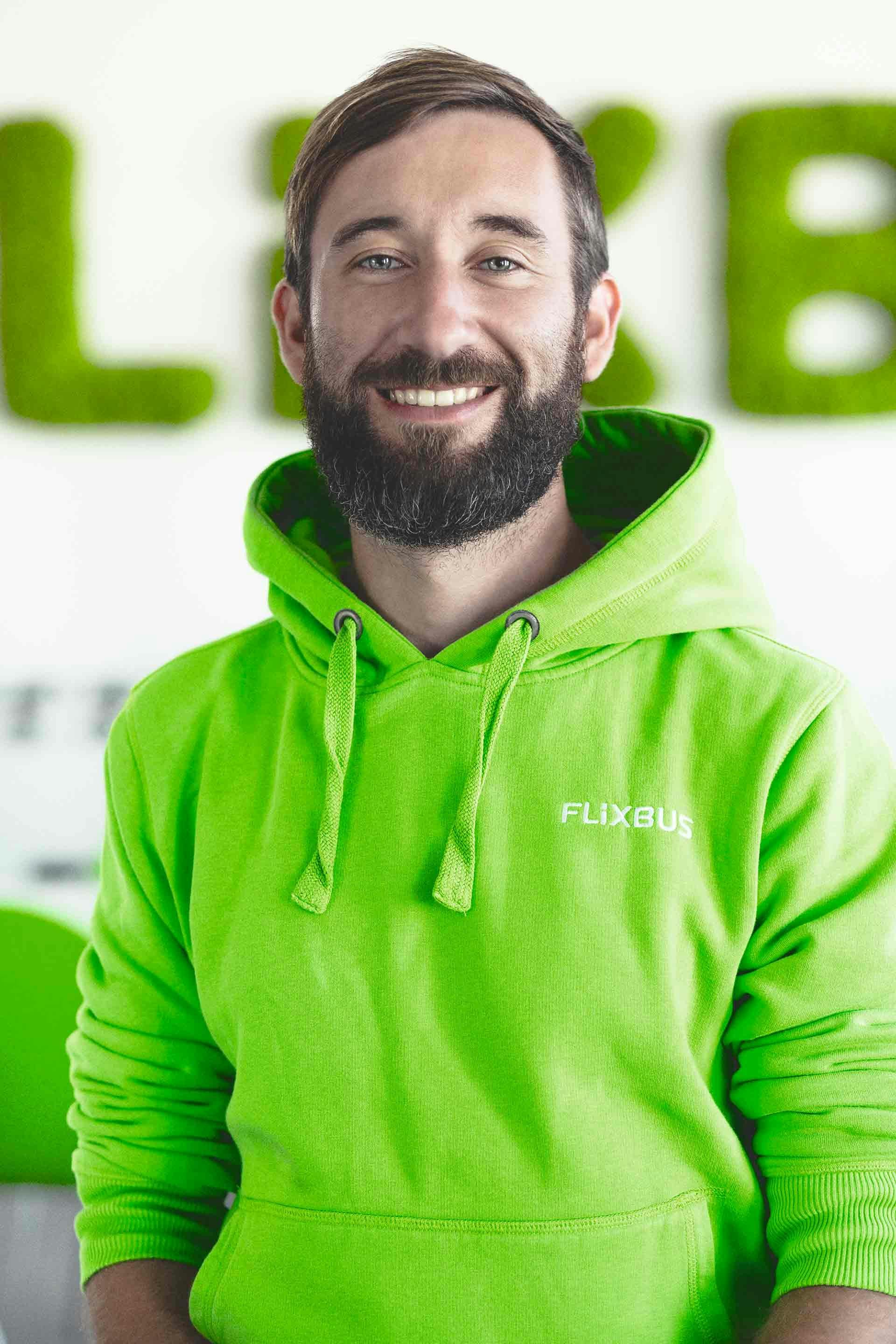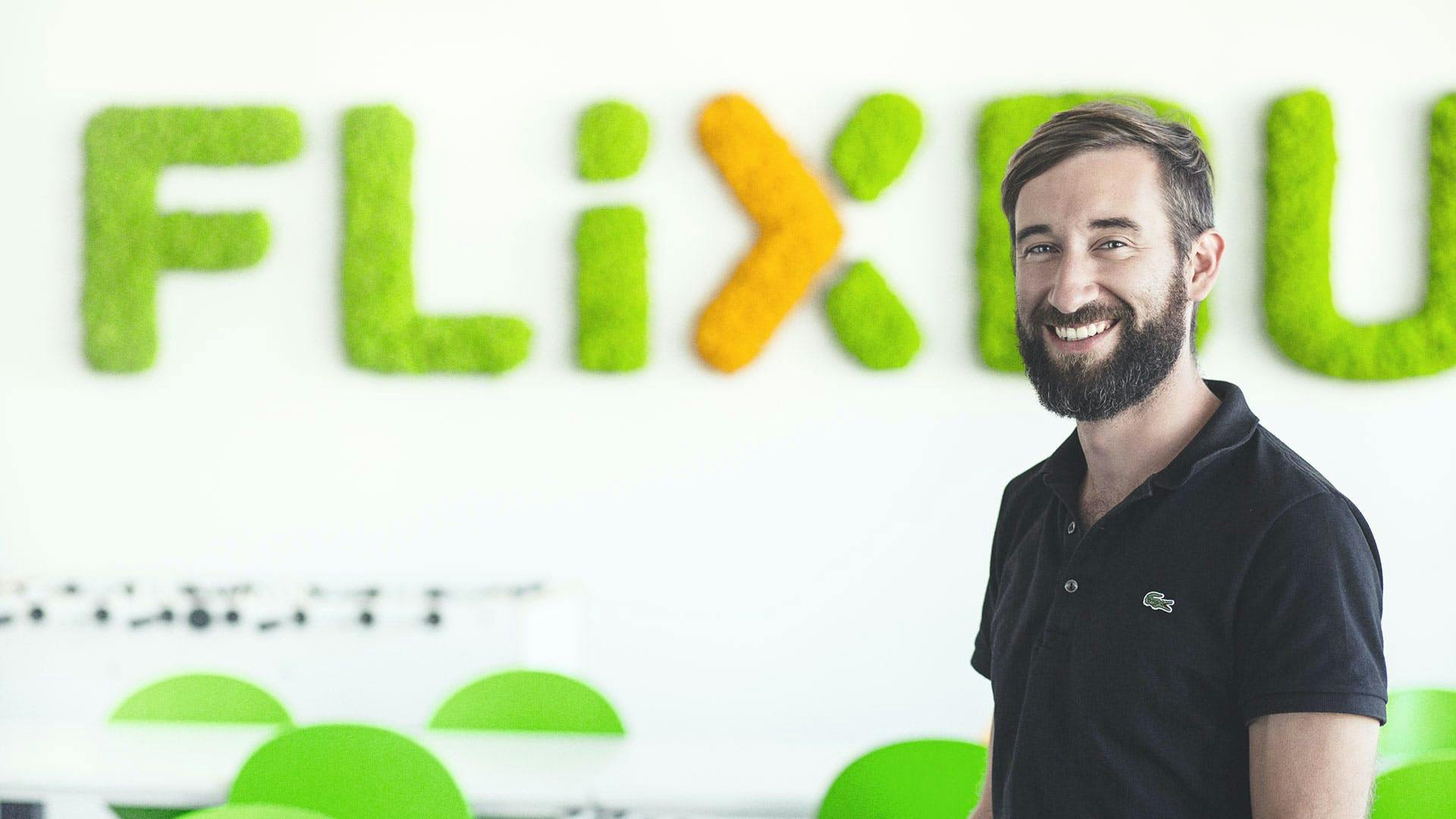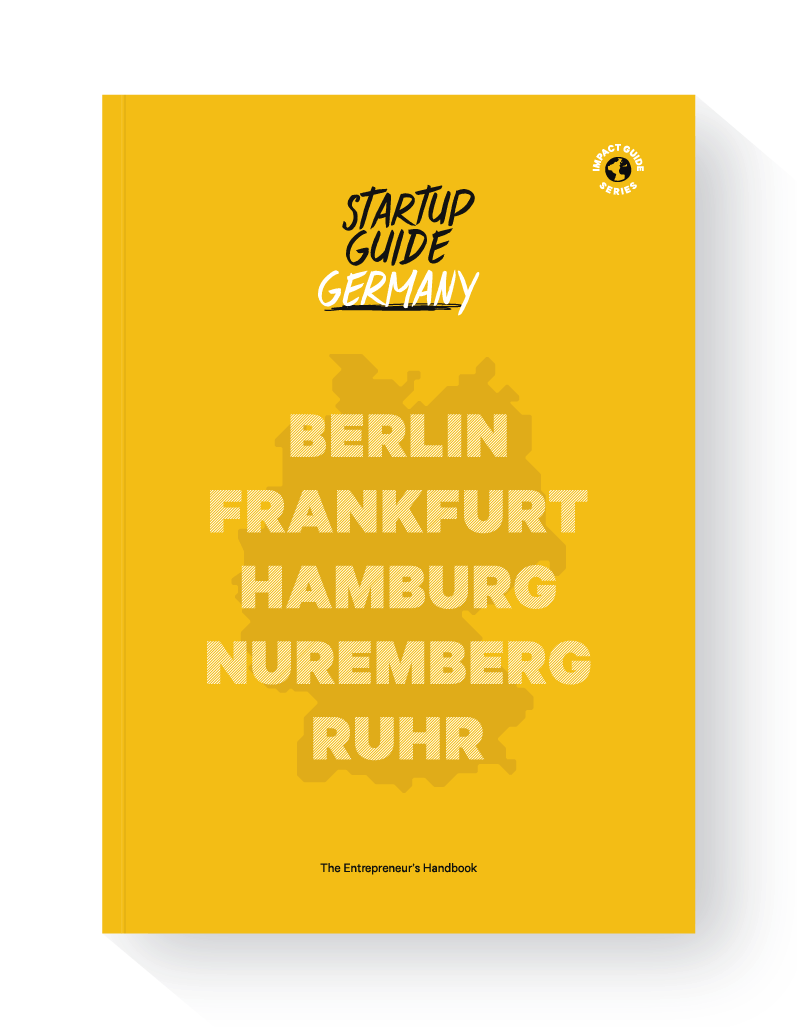Entrepreneurship is a societal responsibility: Daniel Krauss shares the lessons he learned from cofounding Flixbus
lixBus is a sustainable mobility provider with three German offices and a network of regional bus partners in Europe and the United States. It offers environmentally friendly transportation with flexible mobile booking, an innovative ticketing system and carbon-emissions offsets.
Cofounder and CIO Daniel Krauss began his career by founding an IT-consulting startup with his schoolmate André Schwämmlein. They sold the company after two years and Daniel moved on to work in IT for Siemens and Microsoft. He learned valuable lessons from his corporate experience, but says that he saw himself on a golden hamster wheel made out of great benefits and a high salary. Daniel realized he couldn’t do it forever, so he reunited with André and they teamed up with Jochen Engert to start FlixBus in 2013.

Daniel Krauss, Flixbus cofounder and CIO. Photo: FlixMobility GmbH
What lessons did you learn while working for corporations that were applicable to starting your own company?
How you do actual business: contracts, managing stakeholders and acting in a complicated space. We learned how to turn the theories we studied into reality. For example, how P&Ls are structured or what good software architecture looks like. Ultimately, those corporations are made of a bunch of humans who have to work well together towards the same true north. We learned a lot from observing our former companies on how to manage a team and scale up from the three of us to more than a thousand employees. You don’t have to invent the wheel all over again. Look at large corporations to see what they do well, what doesn’t work well, and the reasons behind each outcome. This knowledge isn’t a must-have to start a company, but when young entrepreneurs ask me if it was the right decision to work for a company first, I say yes. It was super valuable, and I would do it again.
How did you get the idea for FlixBus and how much of the eco-friendly aspect was part of the original concept?
When we talked about our different ideas for a startup, it was always crucial for us to do something real, something that has a purpose and has the ability to change something in human lives. But we wanted to start something where there was huge market potential. Without a huge total addressable market, it doesn’t really matter how great the team is or that you have a great product or service. When we learned that the German government was going to apply EU regulation to long-distance transportation and that the sector would have to be reworked, we saw this as our chance to bring our skills together in a huge market. We could offer digital services, a modern style of booking a ticket and we could create a schedule based on an actual need to move people from A to B. The regulation not only boosted our motivation but also helped us attract good talent in the beginning because it has multiple positive impacts on people.
Has the business model changed since you started?
No, not much. We started with a franchise business model – finding hundreds of mobility partners who operate buses or trains reliably and safely in certain transport corridors or certain countries – and we brought the brand, marketing and the customer aspect to their service, as well as our technology focus. We put this together in a revenue-sharing partnership model where we share revenue from tickets booked. This model is the same for trains or buses or any mode of transportation across the countries we are active in.
What are some early failures or successes that you learned from?
From day one we learned to focus on very experienced people, even though they may be expensive, because they come with the ability to work independently. An army of interns won’t decide whether or not you’re going to be successful.
We also may have been too cautious with long-term investments. For example, we built our first IT systems with a third-party provider instead of hiring our own techies, even though our core platform is the heart of our company. You shouldn’t outsource your heart. We had to insource later on and it was more expensive than if we had built it ourselves in the beginning.
One of the cornerstones of our success is the way in which we took a grassroots approach to attracting partners by running around Germany, France and Italy talking to actual transport companies to convince them to join us. One failure we learned was that we hired too quickly and fired too slowly.
How did you build a company culture while growing to over one thousand employees?
You cannot communicate too much. If you as a founder think everyone is supposed to know something, you had better repeat it another three times because you have a communication and information advantage. Also, who you hire is super important, especially when you reach a certain size and you need to hire leaders and managers. It is important to be clear on what you tolerate and what you do not. And in the end, it’s important who you fire. In a little startup, the culture is heavily determined by the personality of the founders. Don’t lock yourself up in your office. Be around your people and try to feel what matters to them. And don’t try to play a role model. Be authentic and be yourself. In the best case, you will be a role model.
From day one we learned to focus on very experienced people, even though they may be expensive, because they come with the ability to work independently.
How has the startup ecosystem in Germany changed from 2005, when you started your first IT consulting company?
In 2005, there was almost no startup ecosystem. Even when we started FlixBus between 2010 and 2012, we were considered exotic because we were in Munich. At that time, there was one ecosystem and it was Berlin. Now there is a broad ecosystem, there are new companies bubbling up in each and every large city. We have three FlixBus offices in Germany now, including one at ZOLLHOF in Nuremberg, which is the region I am from. The current connection between corporates and startups was not present back in 2005 – that is something that has grown over time. Support from the government, which is now part of the ecosystem because it is a relevant business area that employs lots of people, did not exist back in 2005. With all the regulations around starting a company, it took forever, especially compared to the Baltics where everything is digitalized.
In terms of investment, back then there were only a few meaningful funds that had survived the dot com bubble, but these days not only are there a bunch of good investment funds in Germany but there are enough to support early-stage startups. For later-stage startups, I must admit the funds are still too UK- and US-based, but at least there is something. Back in 2005 or even 2010 it was close to impossible to get hundreds of millions of euros in Germany. There is also more mentorship now. When a couple of new startups are successful, it automatically creates mentors who can share successes and failures, so mentorship is something that just happens as part of the startup ecosystem journey.
Do you have a relationship with current startups through mentoring or investing?
Oh yes. The three of us regularly invest in early-stage startups, which we then coach. In the cities where FlixBus is located, there are accelerators, incubators and startups, and we’re active in talking to young companies and attending events. Personally I am also active with an NGO called Startup Teens, where we try to bring entrepreneurship DNA to schools to start giving people tools early on and to help them think about becoming an entrepreneur instead of a teacher or employee, which are more prominent in their school books.
You shouldn’t outsource your heart.
What kind of advice do you give entrepreneurs you’re mentoring?
In the beginning, if you’re only thinking about the idea, you’ll miss two things key to creation. First, the team: the team is more important than the idea. Second, the total addressable market: if your team is great and you have an amazing product or service, but there is no market, you may fail. This is something that enthusiastic founders tend to forget about.
What are some challenges you see for FlixBus in the next five years?
Independent of COVID-19, there will be a change in mobility behaviors, and that can be an opportunity or a challenge. I think people will want to travel more, but it has to be convenient and eco-friendly. Therefore, we try to be in the forefront of providing those mobility services.
As we’re a young company and growing fast, a major challenge is to make sure we grow in a healthy and controlled way. That is a focus for me personally: to work with our leadership team so our growth is always under control. Mobility is still a heavily regulated business all over the world, so regulation is always a challenge, but it can be an opportunity like it was when we started FlixBus. If you look at how low-cost carriers in aviation revolutionized the market, there is a huge opportunity for us to do that in ground transportation. One of our strategic bets is to become a low-cost rail carrier across Europe.
A version of this article is included in Startup Guide Germany, alongside more founder stories and expert insights. Order your copy now!
Written by Rachel Velebny
Repackaged by Anastasia Ilcov

